National Scout jamboree (Boy Scouts of America)
| National Scout jamboree | |||
|---|---|---|---|
.jpg) Opening of the first jamboree, on the National Mall in Washington, June 30, 1937 | |||
|
| |||
The national Scout jamboree is a gathering, or jamboree of thousands of members of the Boy Scouts of America, usually held every four years and organized by the National Council of the Boy Scouts of America. Referred to as "the Jamboree", "Jambo", or NSJ, Scouts from all over the nation and world have the opportunity to attend. They are considered to be one of several unique experiences that the Boy Scouts of America offers. The first jamboree was scheduled to be held in 1935 in Washington, D.C. to celebrate the 25th anniversary of Scouting, but was delayed two years. The 1937 jamboree in the Nation's Capital attracted 25,000 Scouts, who camped around the Washington Monument and Tidal Basin.[1] The event was covered extensively by national media and attended by President Franklin D. Roosevelt.
Following the disruption of World War II, the next jamboree was not held until 1950 in Valley Forge, Pennsylvania.[2] Subsequent jamborees have been held around the country as a means to promoting Scouting nationally. From 1981 to 2010, the jamboree has been located Fort A.P. Hill, Virginia. Beginning in 2013, jamborees will be permanently held at The Summit: Bechtel Family National Scout Reserve in West Virginia.

A jamboree is held for several consecutive days and offers many activities for youth participants and the 300,000 members of the general public who visit it. several days after participants leave, depending on their assignments. Subcamp staff stay in the subcamps with the troops, while other staff stay in the staff camp.
First national Jamboree
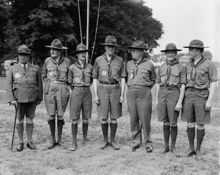
E. Urner Goodman, Program Director (3rd from left)
Walter Head, BSA President (center)
James E. West, Chief Scout Executive (3rd from right)
The first national jamboree was held in Washington, D.C. for ten days in July 1937, attended by 25,000 Scouts, most of whom arrived by train. Region campsites were set up around the Washington Monument and Tidal Basin.[1] The event was covered extensively by radio and newspapers. A press tent accommodated 626 news media reporters, photographers, and broadcasters. Sixty-four news releases were issued and the BSA assisted in the making of 11 newsreels and 53 magazine articles.[3]
The three major U.S. radio networks of the time, NBC, CBS and Mutual, had broadcasting studios near the jamboree headquarters to produce almost 19 hours of live, on–site jamboree coverage broadcast coast–to–coast. Celebrities also visited the jamboree, including well–known broadcaster Lowell Thomas and U.S. President Franklin D. Roosevelt. While at the jamboree, Scouts also attended a three-game baseball series between the Washington Senators and the Boston Red Sox at Griffith Stadium, as well as touring nearby Mount Vernon.[3]
List of jamborees
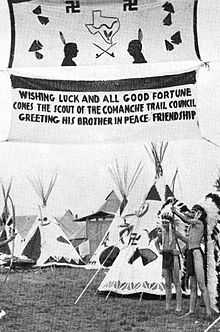
The National Scout jamborees have been held at a number of different locations.[4][5]
| Year | Location | Theme/Notes | Dates | Attendance[6] |
|---|---|---|---|---|
| 1935 | Washington, D.C. | BSA Silver Jubilee (25th) | August 21, 1935–August 30, 1935 | cancelled due to a polio epidemic.[7] |
| 1937 | Washington D.C.[8] | June 30, 1937–July 9, 1937 | 27,238 | |
| 1950 | Valley Forge, Pennsylvania | "Strengthen Liberty" | June 27, 1950–July 6, 1950 | 47,163 |
| 1953 | Irvine Ranch, California (Area now called Newport Center and Fashion Island) |
"Forward on Liberty's Team" Jamboree Road built for the event |
July 17, 1953–July 23, 1953 | 45,401 |
| 1957 | Valley Forge, Pennsylvania | "Onward For God And My Country" | July 12, 1957–July 18, 1957 | 52,580 |
| 1960 | Colorado Springs, Colorado | "For God and Country" BSA Golden Jubilee (50th) |
July 22, 1960–July 28, 1960 | 56,377 |
| 1964 | Valley Forge, Pennsylvania | "Strengthen America's Heritage" | July 17, 1964–July 23, 1964 | 50,960 |
| 1969 | Farragut State Park, Idaho | "Building to Serve" | July 16, 1969–July 22, 1969 | 34,251 |
| 1973 | Farragut State Park, Idaho and Moraine State Park, Pennsylvania | "Growing Together" | August 1, 1973–August 7, 1973 (ID) August 3, 1973–August 9, 1973 (PA) |
73,610 (Combined) |
| 1977 | Moraine State Park, Pennsylvania | "Forward Together, Scouting, America" | August 3, 1977–August 9, 1977 | 28,601 |
| 1981 | Fort A.P. Hill, Virginia | "Scouting's Reunion with History" | July 29, 1981–August 4, 1981 | 29,765 |
| 1985 | Fort A.P. Hill, Virginia | "The Spirit Lives On" BSA Diamond Jubilee (75th) |
July 24, 1985–July 30, 1985[9] | 32,615 |
| 1989 | Fort A.P. Hill, Virginia | "The Adventure Begins...With America's Youth" | August 3, 1989–August 9, 1989 | 32,717 |
| 1993 | Fort A.P. Hill, Virginia | "Scouting...A bridge to the Future" | August 4, 1993–August 10, 1993 | 34,449 |
| 1997 | Fort A.P. Hill, Virginia | "Character Counts...Be Prepared for the 21st century" | July 28, 1997–August 6, 1997 | 36,015 |
| 2001 | Fort A.P. Hill, Virginia | "Strong Values, Strong Leaders...Character Counts" | July 23, 2001–August 1, 2001 | 42,002 |
| 2005 | Fort A.P. Hill, Virginia | "Character Not Only Counts, It Multiplies" | July 25, 2005–August 3, 2005 | 43,307 |
| 2010 | Fort A.P. Hill, Virginia | "Celebrating the Adventure, Continuing the Journey"[10] (100th Anniversary) | July 26, 2010–August 4, 2010 | 43,434 |
| 2013 | The Summit Bechtel Family National Scout Reserve West Virginia | "Go Big. Get Wild." | July 15, 2013–July 24, 2013 | 40,795 |
| 2017 | The Summit Bechtel Family National Scout Reserve West Virginia | |||
| 2021 | The Summit Bechtel Family National Scout Reserve West Virginia | |||
Organization
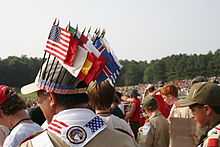
Like the Boy Scouts of America's national organization, the jamboree is divided into regions—Western, Central, Southern and Northeast.[11] Each region is made up of five to six subcamps, with twenty in all. Each subcamp has its own latrines, shower facilities, food commissaries, with one action center per region. Each subcamp contains a number of troops, identified by a three or four digit number depending on the location of the subcamp within the encampment. The 2005 National Scout Jamboree had 20 subcamps, identified by number and named after famous explorers (e.g. Robert Ballard, Steve Fossett, Joe Kittinger, and Will Steger.)
Effective with the 2013 Jamboree, subcamps will not be operated by the regions.[12]
National jamborees are now traditionally held two years after a World Jamboree. 2010 is a slight aberration in the schedule (which resumes in 2013) due to the 100th anniversary of BSA.
Troops and contingents

Attending the jamboree is an intensive and expensive process. Considering the logistics of having thousands of youth and their leaders concentrated in one area at one time, the Jamboree Division of the National Council coordinates the entire jamboree process. A normal Boy Scout troop cannot petition to attend the jamboree as participants, instead, the local council establishes a jamboree committee which is charged with promoting and facilitating the experience to their members. Local council committees typically have volunteer members responsible for finance, fundraising, training, recruitment, transportation, touring while en route to the jamboree site, and other functions where appropriate.
Youth members sign up for the jamboree through an application process to the local council, who then places each boy into the jamboree troop. Large councils are granted multiple jamboree troops. Each troop comprises four adults (a Scoutmaster, and three assistant Scoutmasters) and 36 youth in four traditional patrols of eight boys each, plus a leadership corps of four older boys (senior patrol leader, assistant senior patrol leader, quartermaster, and scribe). Scouts must be at least 12 years old on the first day of the jamboree and at least First Class Scouts.[13] After being assigned a jamboree troop, members are given their troop numbers, a participant's patch for wear on the Scout's field uniform, and the council's Jamboree Shoulder Patch. Training and preparation for the jamboree often begins more than a year before the actual jamboree begins. Most troops require the adult leaders to obtain Basic Scoutmaster training, and some require Wood Badge, an intensive management training course offered by the BSA. Additionally, the Scoutmaster and one assistant Scoutmaster must be over 21, and another assistant Scoutmaster must be between 18 and 21 throughout the jamboree. The final assistant Scoutmaster may be any age over 18.
Staff
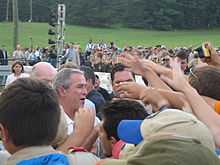
Youth and adult volunteer and professional Scouters provide a number of services to the jamboree by being on staff. Additionally, when the jamboree was at Fort A.P. Hill, members of the military and government services also assisted with providing services to the jamboree. Jamboree staff are given a special hat and neckerchief as tokens of their service, plus many of the different staff groups have special patches or pins that are sought after by youth and adult participants. In addition to the regional staff that provide services in subcamps and at the regional activity centers, many other staff members work in areas that serve the entire jamboree. Staff members arrive a number of days before the jamboree begins and usually depart on the same day or
The Scott Summit Bechtel Family National Scout Reserve (SBR)

The BSA announced in June 2008 that locales interested in permanently hosting the national jamboree should submit applications to BSA. Permanent jamboree site considerations included 5,000 acres (20 km2) to be donated or leased for 100 years, water, natural beauty, transportation, ability to also host World Jamborees, and use as a BSA high adventure/training center in non-jamboree years.
Goshen Scout Reservation in Virginia was selected for the new site in February 2009,[14] [15] but was withdrawn due to significant restrictions on land utilization[16] and local community opposition.
The Summit Bechtel Family National Scout Reserve in the New River Gorge region was chosen as the new home of the national Scout jamboree in November 2009.[17] The purchase of the property was made possible by a $50 million gift from the S. D. Bechtel, Jr. Foundation.[18][19] Other donations, including a $25 million donation from The Suzanne and Walter Scott Foundation and a gift of an undisclosed amount from Mike and Gillian Goodrich, as well as other donations, have brought the total amount of contributions for The Summit to over $100 million in under one year.[20] A portion of the 10,000-acre (40 km2) property is a reclaimed mine site once known as Garden Grounds. It is located along the New River Gorge National River near Mount Hope, West Virginia and north of Beckley, West Virginia.[21]
Early announcements from The Summit team at the 2010 National Scout Jamboree, and subsequently on Facebook announced that Venturing would be a part of the jamboree, not just as staff, but as participants.[22] This would mark the first appearance of Venturing at a jamboree, and the first attempt to expand the program to include the senior scouting program of the BSA since the attempted inclusion of Exploring in 1989.
Jamboree traditions
Patch trading
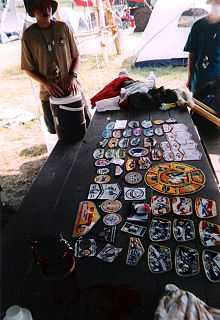
Most troops that attend the jamboree have a special patch, or series of patches, made especially for the jamboree. Once at the jamboree, Scouts trade their council's patches for patches from across US and even the world. At each jamboree there are always several hot patches, that everyone seems to want, usually a patch relating to something in pop culture. At the 2005 National Scout Jamboree, popular patches displayed such things as Ron Jon Surf Shop, Master Chief from Halo, Star Wars characters, Super Mario, SoBe energy drink, and the unofficial, yet still sought after, Hooters patches. At the 2010 Jamboree, sought-after patches included Marvel superheroes from both Theodore Roosevelt Council and Northern New Jersey Council, Halo, Blues Brothers, the Orange County set (filled with vibrant images of surfers), the Central Florida Guitars (which made music when squeezed), the Great Salt Lake racers, and all sorts of military helicopters and planes, as well as a reappearance of the Hooters patches. Other unofficial patches included fake Halo patches, and a set of Order of the Arrow pocket flaps which included designs from popular internet games, such as Farmville.
Gateways

Each unit that attends the jamboree is assigned to a campsite. In front of the camp site, the troop constructs a gateway to display trademarks of their council or state. Gateways can range from the very simple to the extremely elaborate. Gateways will no longer be part of the jamboree as of 2013.
Stadium Shows
Stadium Shows are an extreme BSA Party. They can include speeches, music and promote brotherhood
Military support lawsuit
On April 4, 2007, a US Court of Appeals ruled that federal support for the national jamboree may continue.
See also
References
- ↑ 1.0 1.1 "National Jamboree". Time magazine. July 12, 1937. Retrieved September 24, 2008.
- ↑ Valley Forge National Historical Park: Making and Remaking a National Symbol (Chapter 8)
- ↑ 3.0 3.1 The National and World Jamborees in Pictures, New York: Boy Scouts of America (1937).
- ↑ January 2009 Jamboree Bulletin
- ↑ West Texas Scouting History
- ↑ 2010 National Scout Jamboree had highest attendance since 1973
- ↑ "1st National Jamboree (1935)". Pine Tree Web. 1998. Retrieved June 18, 2009.
- ↑ "1st National Jamboree (1937)". Pine Tree Web. 1998. Retrieved June 18, 2009.
- ↑ "Participants in the 1985 National Jamboree". West Texas Scouting History. Texas Trails Council, BSA. Retrieved June 18, 2009.
- ↑ Subcamp operations guide
- ↑ Nelson, Bill. "Organization of the Boy Scouts of America". U.S. Scouting Service Project. Retrieved March 12, 2008.
- ↑ https://summit.scouting.org/en/Pages/2013-Jamboree-FAQ.aspx
- ↑ Boy Scouts of America, "Boy Scout Qualifications", "Scouting.org"
- ↑ "Boy Scouts of America to Pursue Negotiations With Sites in Eastern Region to Establish National Scouting Center". The Earth Times. February 11, 2009. Retrieved February 12, 2009.
- ↑ "BSA Project Arrow Committee settles on site for National Scouting Center". PR Newswire Association LLC. February 11, 2009. Retrieved February 20, 2009.
- ↑ "Boy Scouts No Longer Looking At Goshen". The News-Gazette. July 29, 2009. Retrieved August 4, 2009.
- ↑ Boy Scouts’ announcement ‘unbelievable partnership’ » Local News » The Fayette Tribune, Oak Hill, W.Va
- ↑ "The Summit: Bechtel Family National Scout Reserve". Retrieved November 18, 2009.
- ↑ "Boy Scouts to Bring World-Class Center of Scouting Excellence to West Virginia" (Press release). Boy Scouts of America. November 18, 2009. Retrieved August 14, 2010.
- ↑ Boy Scouts of America Announces Additional Donations to The Summit Bechtel Family... - GLEN JEAN, W.Va., Oct. 22 /PRNewswire/
- ↑ Goshen Will Not Host Scout Jamboree
- ↑ "Facebook: The Summit Bechtel Family National Scout Reserve". Retrieved November 11, 2010.
External links
| Wikimedia Commons has media related to National Scout jamboree (Boy Scouts of America). |
- 2013 National Scout Jamboree, official BSA website
- NationalJambo.Org community for participants, staff, alumni, visitors, and friends
- IEEE emeritbadges.org Program
- Harry Truman's address to the Jamboree
| ||||||||||||||||||||||||||||||||||||||||||||||||||||||||||||||||
| |||||||||||||||||||||||||||||||||||||||||||||